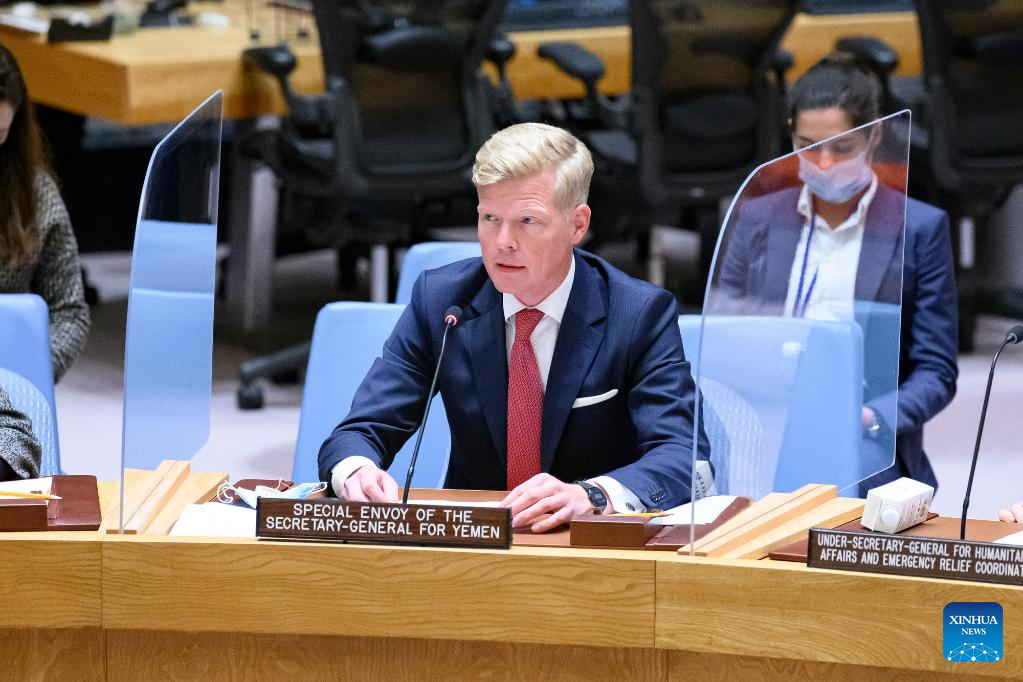
UN Special Envoy for Yemen Hans Grundberg speaks at a Security Council meeting on Yemen at the UN Headquarters in New York on Feb. 15, 2022. Hans Grundberg said Tuesday that he is developing a framework that will set out his plan to move toward an inclusive political settlement, including the establishment of a multi-track process. (Loey Felipe/UN Photo/Handout via Xinhua)
UNITED NATIONS, Feb. 15 (Xinhua) -- UN Special Envoy for Yemen Hans Grundberg said Tuesday that he is developing a framework that will set out his plan to move toward an inclusive political settlement, including the establishment of a multi-track process.
Through this process, the warring sides' interests can be addressed within the context of a broader Yemeni agenda along the three tracks of political, security and economic matters, he told the Security Council in a briefing.
Despite many challenges, there is a way out of the war in Yemen. Allowing the war to continue is a choice, and so is ending it, he said. "We all know that ending it will not be easy, but I firmly believe that it is possible."
He said he will next week begin a series of structured bilateral consultations aimed at informing and refining the framework. He will engage with multiple Yemeni stakeholders, including the warring parties, political parties, representatives of civil society, and Yemeni experts in the political, security and economic arenas.
"The consultations will explore Yemenis' priorities for the immediate and longer term for the three tracks, as well as their aspirations and broader vision for ending the conflict," said Grundberg. "I count on the support of this council to encourage all actors to participate constructively without delay. This is a real opportunity for Yemeni parties to shift gear and charter a peaceful way forward."
For too long Yemenis have been without a political process and without hope that this conflict can end. Through initiating a structured process trying to address the key elements of the conflict, hope for an end to the devastating military, political and economic battles can be restored, he said.
Grundberg said he looks forward to presenting his framework later this spring.
In parallel, he said, he is continuing to explore every possibility of fast-tracking de-escalation.
"I have continuously engaged with the warring parties on possible mutually agreeable compromises. In recent meetings in Riyadh and Muscat, I urged the conflict parties to engage in de-escalation talks and I have presented options for moving forward," he said, adding that, until now, his calls and the calls of the Security Council for restraint and de-escalation have remained unanswered.
"As we have seen over the past two years, positions are mutually exclusive with demands on sequencing and guarantees unable to be met by the other side. My efforts in this regard, nevertheless, will continue and I remain actively engaged with the warring sides in pursuit of any opening and will report back to this council on any progress," he said.
Grundberg said he will keep working on the two lines of effort: establishing a multi-track process that can produce durable solutions to this conflict while seeking any opportunity for immediate de-escalation.
"My conviction is that a structured and focused approach that does not shy away from the fundamental and complex challenges is needed. However, trust is low and ending this war will require uncomfortable compromises which no warring party is currently willing to make," he said.
Following the attacks last month by Houthis on the United Arab Emirates (UAE), including on a civilian airport and nearby industrial areas, where three civilians were killed, it should be obvious to everyone just how high the stakes have become. Furthermore, the attacks on the UAE and Saudi Arabia indicate how this conflict risks spiraling out of control unless serious efforts are urgently made by the Yemeni parties, the region and the international community to end this conflict, he said.
For Yemenis, the past month was marked by a multiplication of front lines and appalling record numbers in civilian casualties. The Saudi-led military coalition's airstrike on a detention facility in the northern Yemeni city of Saada was the worst civilian casualty incident in three years. The sharp increase in airstrikes in Yemen, including on residential areas in Sanaa and Hodeidah is alarming, said Grundberg.
Yemen's war continues to be fought also in the economic arena, with warring sides battling over resources, trade flows and monetary policy. The impact of this aspect of the war continues to irrefutably hit Yemen's population as a whole. The past month has seen particularly severe shortages in fuel and oil derivatives, notably in areas controlled by Houthis, putting unprecedented strain on the everyday lives of people, he said.
The war is also fought in the public domain with increasingly hostile media rhetoric combined with intimidation, detention and harassment of media professionals and activists in Yemen. This contributes to a toxic environment when there is a need for dialogue, said Grundberg. ■



